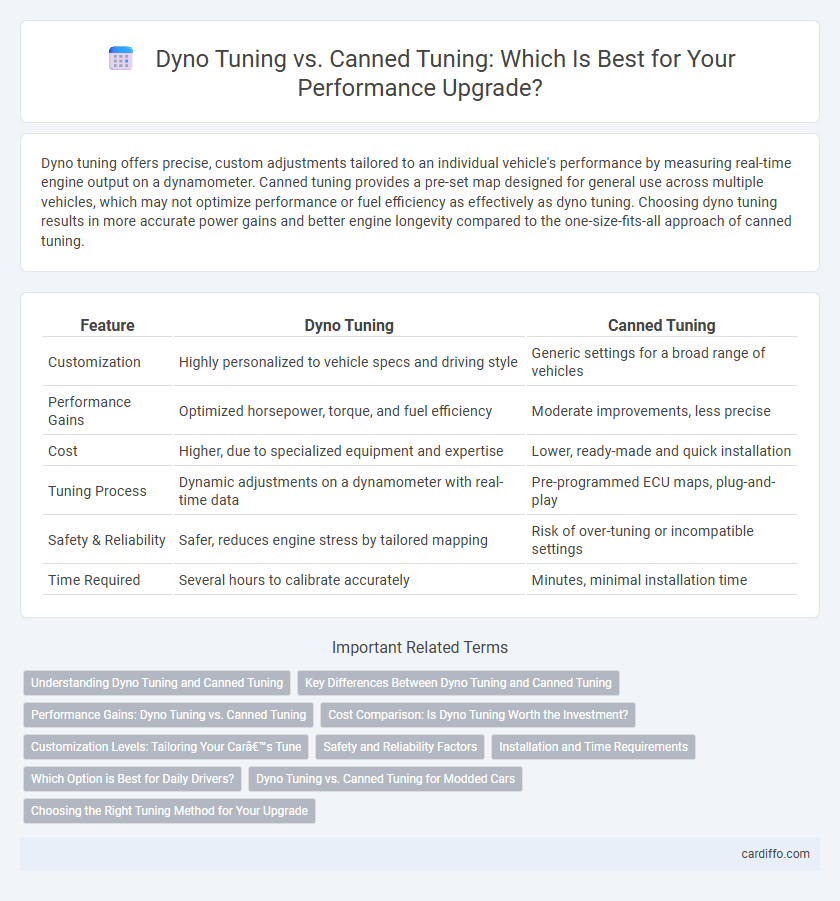Dyno tuning offers precise, custom adjustments tailored to an individual vehicle's performance by measuring real-time engine output on a dynamometer. Canned tuning provides a pre-set map designed for general use across multiple vehicles, which may not optimize performance or fuel efficiency as effectively as dyno tuning. Choosing dyno tuning results in more accurate power gains and better engine longevity compared to the one-size-fits-all approach of canned tuning.
Table of Comparison
| Feature | Dyno Tuning | Canned Tuning |
|---|---|---|
| Customization | Highly personalized to vehicle specs and driving style | Generic settings for a broad range of vehicles |
| Performance Gains | Optimized horsepower, torque, and fuel efficiency | Moderate improvements, less precise |
| Cost | Higher, due to specialized equipment and expertise | Lower, ready-made and quick installation |
| Tuning Process | Dynamic adjustments on a dynamometer with real-time data | Pre-programmed ECU maps, plug-and-play |
| Safety & Reliability | Safer, reduces engine stress by tailored mapping | Risk of over-tuning or incompatible settings |
| Time Required | Several hours to calibrate accurately | Minutes, minimal installation time |
Understanding Dyno Tuning and Canned Tuning
Dyno tuning involves customizing a vehicle's engine performance using a dynamometer to measure output and adjust parameters for optimal power and efficiency. Canned tuning relies on pre-programmed maps designed for general applications, offering a quick and easy solution without vehicle-specific adjustments. Understanding the precise calibration benefits of dyno tuning versus the convenience and cost-effectiveness of canned tuning helps determine the best upgrade approach for different driving needs.
Key Differences Between Dyno Tuning and Canned Tuning
Dyno tuning customizes engine performance by using real-time data from a dynamometer to optimize parameters like air-fuel ratio and ignition timing, ensuring precise calibration for individual vehicles. Canned tuning relies on pre-set maps developed for a general range of models, offering a quick but less personalized performance boost. The key difference lies in dyno tuning's tailored adjustments for maximum efficiency and power versus canned tuning's convenient, one-size-fits-all approach.
Performance Gains: Dyno Tuning vs. Canned Tuning
Dyno tuning offers precise performance gains by customizing the engine's fuel, ignition, and boost parameters based on real-time data collected during testing, resulting in optimized horsepower and torque tailored to specific vehicle modifications. Canned tuning uses pre-set maps designed for general applications, often leading to moderate improvements but lacking the fine-tuned adjustments necessary for maximizing performance on individual vehicles. Vehicles with aftermarket parts or unique driving conditions benefit significantly more from dyno tuning due to its adaptability and accurate calibration.
Cost Comparison: Is Dyno Tuning Worth the Investment?
Dyno tuning typically costs between $300 and $700, offering precise adjustments to optimize engine performance and fuel efficiency compared to canned tuning's fixed maps priced around $100 to $200. Although canned tunes are cheaper and quicker to install, dyno tuning provides personalized calibration tailored to the vehicle's specific modifications, ensuring maximum horsepower gains and reliability. For enthusiasts seeking optimal results and long-term value, the higher upfront cost of dyno tuning often justifies the investment through enhanced performance and potential fuel savings.
Customization Levels: Tailoring Your Car’s Tune
Dyno tuning provides a highly customized approach by measuring your car's specific performance metrics on a dynamometer, allowing precise adjustments to fuel, ignition, and boost parameters for optimal power and efficiency. Canned tuning relies on pre-programmed maps designed for general vehicle models, offering a quick but less personalized upgrade. Customization levels in dyno tuning enable bespoke calibrations that cater to unique modifications and driving styles, ensuring maximum performance gains tailored to your vehicle's exact needs.
Safety and Reliability Factors
Dyno tuning customizes engine parameters to match the specific vehicle's performance and ensures optimal safety by reducing risks of engine knock and component stress. Canned tuning offers generic adjustments that may compromise reliability due to lack of precise calibration for individual engine conditions. Prioritizing dyno tuning enhances long-term durability and minimizes potential damage caused by improper fuel and ignition settings.
Installation and Time Requirements
Dyno tuning requires precise installation and calibration on a dynamometer, often taking several hours to complete due to real-time adjustments and data monitoring. Canned tuning offers a faster installation process since pre-configured maps are simply loaded onto the vehicle's ECU, typically finishing within 30 to 60 minutes. The time efficiency of canned tuning comes at the cost of personalized optimization, which dyno tuning achieves through detailed, vehicle-specific adjustments.
Which Option is Best for Daily Drivers?
Dyno tuning provides a customized performance adjustment tailored to a vehicle's specific engine and conditions, maximizing efficiency and power gains for daily drivers. Canned tuning offers pre-set maps designed for general applications, making it a quicker and more affordable option but potentially less optimized for everyday driving scenarios. For daily drivers seeking reliable improvements without compromising drivability, dyno tuning typically delivers better fuel economy, smoother throttle response, and enhanced engine longevity.
Dyno Tuning vs. Canned Tuning for Modded Cars
Dyno tuning customizes engine parameters based on real-time data, maximizing performance and reliability for heavily modded cars. Canned tuning uses pre-programmed maps that may not account for specific modifications, risking suboptimal performance or engine damage. Modded vehicles benefit most from dyno tuning due to its precision in adapting fuel, ignition, and boost settings to the unique setup.
Choosing the Right Tuning Method for Your Upgrade
Selecting the right tuning method for your upgrade depends on your vehicle's specific modifications and performance goals. Dyno tuning offers precise, custom calibration by measuring real-time engine parameters, optimizing power and fuel efficiency tailored to your setup. In contrast, canned tuning provides pre-set maps that are easier and quicker to install but may lack the fine-tuned adjustments necessary for maximizing performance on highly modified engines.
dyno tuning vs canned tuning Infographic

 cardiffo.com
cardiffo.com